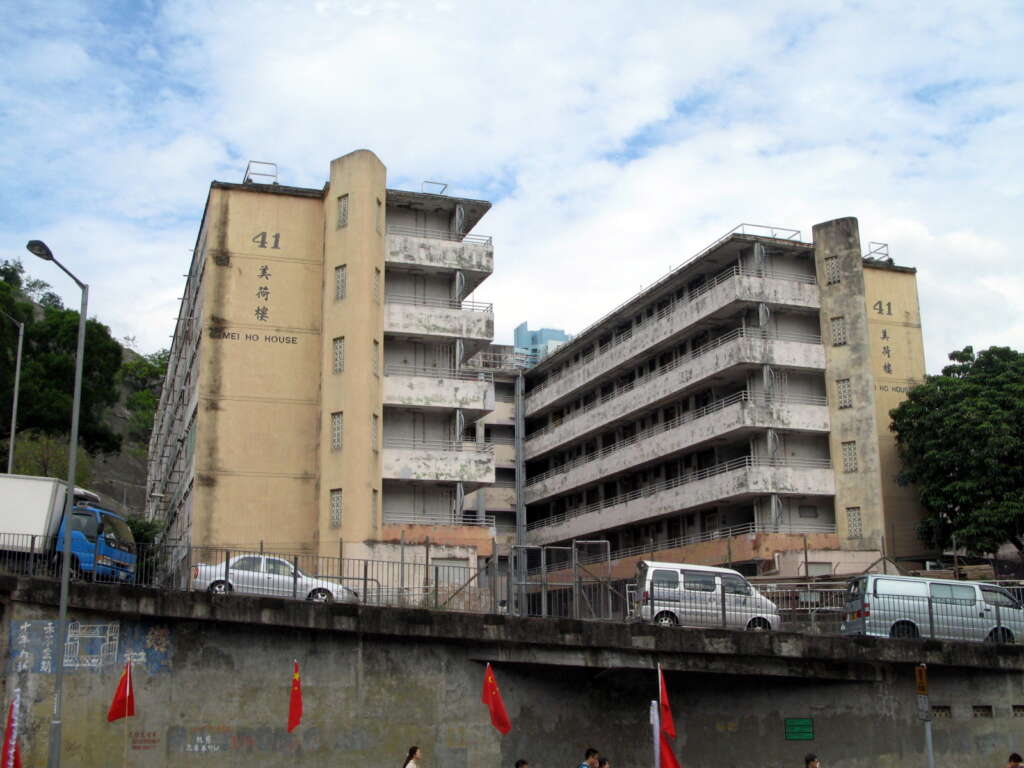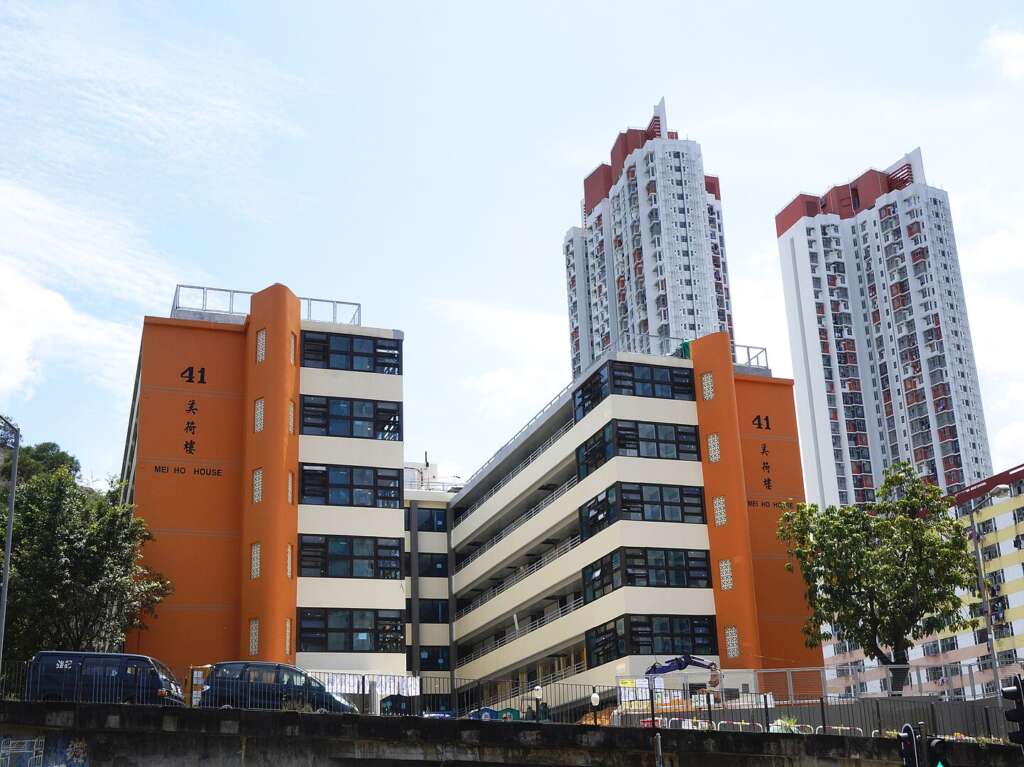The journey of Paul Chan Mo-po from a humble background to the finance ministers table at Davos parallels the rise of Hong Kong itself
A TRAGIC SHANTY TOWN fire in Hong Kong in the 1950s left more than 50,000 people homeless at a time when the population was growing through immigration by more than 10,000 people a week.
How to house everyone? The Hong Kong government first tried rapidly building bungalows but eventually made an extraordinary decision that would change the shape of the city forever: they decided to build upwards instead of outwards.
Rather than erecting houses for families of four or five people, each structure would accommodate 2,500 people: five or six thousand families at once.
The result was a new paradigm for Hong Kong, which would eventually become the world’s most high-rise city.

MAKING HISTORY
Today, there is just one of those original housing blocks remaining. Mei Ho House (pictured above and below) has been lovingly revamped and now a popular place for nostalgic visitors, history buffs or just people wanting a pleasant spot to spend a few days on holiday.

But an equally extraordinary story is that of a young boy who was born in the area, Shek Kip Mei in the Kowloon peninsula. Born in 1955, his name was Chan Mo-po. He came from a humble background, and worked two jobs, civil servant by day and lecturer by night.
But he had an exceptional mind, and rose through Chinese University in Hong Kong and Harvard University in the United States to become this city’s top moneyman: Financial Secretary Paul Chan.
RETURN TO SHEK KIP MEI
Viewers this month saw Mr Chan return to the scene of Mei Ho House, the last remaining mass housing block. “I grew up in this neighborhood just a few blocks away,” he told interviewer Nick Chan Hiu-fung on Friday Beyond Spotlights.

Paul Chan’s journey from a resettlement estate to the top of the ladder parallels the city’s own growth from a small entrepot to one of the world’s great financial centers.
In a conversation on the site of historic events, Paul Chan talked about his work. Although he has been in his professional role since 2017, his job has not been getting easier—and he found he shared the challenges with other finance chiefs at global meetings such as the World Economic Forum in Davos, and the APEC gathering in the United States last year.
After the pandemic, many finance chiefs were left in with budget deficits, he said. “Returning the budget to balance is one of the key subjects of discussion and then the other one is that, you know, given the geopolitics, political economic fragmentation has been worrying,” he said. “So people are talking about how to work together how to promote multilateral trading and investment.”
[Watch the video interview below or scroll down to read more of this report.]
Mr Chan said he was also very aware of the big issues away from finance, such as climate change. Yet despite the number of concerns in the world, he found that his home country had quietly became a major focus for everyone. “One important takeaway for me was that although the APEC Conference was held in San Francisco, it seems to me the center of attention is China.”
HELPING DEVELOPING NATIONS
All countries have an inward and an outward focus, but China’s outreach efforts are unusual, in that it takes an interest in helping developing countries grow.
“We are promoting multilateralism, promoting trade, investment, cross-border cooperation, and particularly the emphasis is on not just growing by yourself, but also to help the developing countries, help those in need, so that the fruit of economic success can be shared,” he said.

HONG KONG’S ROLE
The role of Hong Kong in the country as whole is also of great significance. In the Chinese central government’s 14th Five Year plan, Hong Kong has been given a number of functions.
“Hong Kong has been given eight directions to develop, but it seems to me in terms of economic growth, the most important two areas are financial services and Innovation and Technology,” he said. “I think on these two are areas we could make a lot of contribution to the country as well as our own economic growth.”
As a world-class financial center, “we continue to work hard to stay competitive, to stay ahead of the game,” he said. “So recently in terms of the equity market, in terms of the bond market, in terms of, say, for example, Web 3.0, virtual assets, we have been taking a lot of initiatives to drive ourselves forward.”
In terms of innovation and technology, Hong Kong has priority access to the mainland, but at the same time operates in an international way, with free-flow of capital, goods, data and money. “So we will be able to bridge the Mainland and the international community,” he said.
HONG KONG’S ATTRACTIONS
Despite the negative press from the west, Chan is very upbeat on Hong Kong for many reasons—and is sure good people will continue to flow in.
Hong Kong is a good place for making healthy returns on business, but it also offers a good lifestyle, safe and cosmopolitan, he said.
And the city is a great place for families. “We have over 50 international schools offering different curriculums,” he pointed out. For families with older children, Hong Kong has five universities in the world’s top 100 – more than any other city on earth.
PRIZED POSSESSION
Children were also on his mind when he showed Nick Chan an item he had brought with him. Asked to show a prized possession, Paul Chan showed a hand-written ideas board that was created during a consultation with a group of secondary school students.

“The question we posted to them was: If you were a financial secretary, would you do? What would your priorities be?” he said.
The youngsters delivered ideas which were written on the board—and Chan liked them so much he took the board home with him. He was touched by the way the children not only came up with financial suggestions, but expressed concern about the environment and about needy people in society.
To Chan, that’s his message too. Finance is not just about balancing books or ensuring that money grows. It’s about society and making the world a better place.
And Mei Ho House, built at high speed in the face of tragedy, but now a place of comfort and peace, is a perfect example.
All images by Friday Beyond Spotlights unless otherwise indicated.
